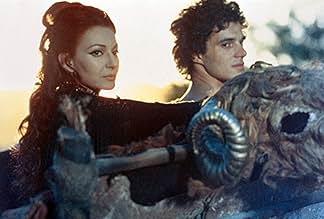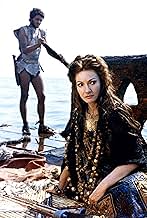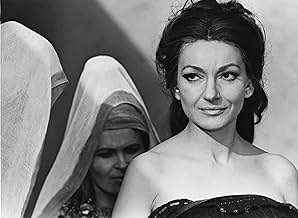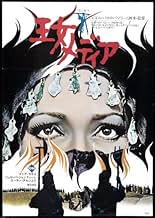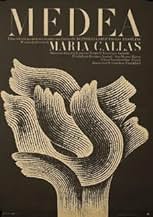IMDb-BEWERTUNG
6,9/10
5845
IHRE BEWERTUNG
Auf der Suche nach dem Goldenen Vlies kehrt Jason mit der mächtigen Zauberin Medea nach Griechenland zurück. Aber als der König sie verbannt, schmiedet Medea finstere Rachepläne.Auf der Suche nach dem Goldenen Vlies kehrt Jason mit der mächtigen Zauberin Medea nach Griechenland zurück. Aber als der König sie verbannt, schmiedet Medea finstere Rachepläne.Auf der Suche nach dem Goldenen Vlies kehrt Jason mit der mächtigen Zauberin Medea nach Griechenland zurück. Aber als der König sie verbannt, schmiedet Medea finstere Rachepläne.
- Regie
- Drehbuch
- Hauptbesetzung
- Auszeichnungen
- 2 Nominierungen insgesamt
Margareth Clémenti
- Glauce
- (as Margareth Clementi)
Annamaria Chio
- Wet-nurse
- (as Anna Maria Chio)
Empfohlene Bewertungen
To win the kingdom his uncle took from his father, Jason must steal the golden fleece from the land of barbarians...
When the film opened up and we had the glimpse of a filthy centaur, I was pretty much sold that this film was going to be good, or at least unforgettable. The remainder may not have had as much magic, but it did not disappoint in originality... and cannibalism.
Typically when I think of Italian mythology films, I think of the "sword and sandal" films. This is not one of those. Rather than make the story all romantic and flashy, we get a world that is probably much closer to reality. Assuming that the event told in myth are many, many years BCE, it makes sense to show a much more primitive world than we expect. And in that sense, this film does not disappoint.
When the film opened up and we had the glimpse of a filthy centaur, I was pretty much sold that this film was going to be good, or at least unforgettable. The remainder may not have had as much magic, but it did not disappoint in originality... and cannibalism.
Typically when I think of Italian mythology films, I think of the "sword and sandal" films. This is not one of those. Rather than make the story all romantic and flashy, we get a world that is probably much closer to reality. Assuming that the event told in myth are many, many years BCE, it makes sense to show a much more primitive world than we expect. And in that sense, this film does not disappoint.
"Hell hath no fury like a woman scorned" describes Medea, whose hubris and amour fou for the bold and beautiful Jason leads to her downfall. Revered as a goddess by her own people, she betrays her own divinity and her race when she aids him to steal the sacred fleece, killing her own god-brother by decapitation during their escape. After bearing two sons to Jason in Greece, Medea is still not accepted and fails to adjust to Greek culture. The affection of acclaimed hero Jason strays and his ambition culminates in a betrothal to King Kreon's daughter. But when Medea learns of this betrayal and negation of her love and sacrifice her fury knows no bounds. She summons up the dark forces within her (she is a barbarian sorceress after all) for vengeance against those who have wronged her by killing Jason's sons, welcoming him with a false semblance of conciliation and acceptance while serving his dead sons to him for dinner. She sends two magnificent marriage cloaks to the king and his daughter who, when they don them, burst into flames. She then departs in rage leaving Jason to live with the results of the infamy he caused her enact through destroying her life. Maria Callas, in her only film, shows the famous range and subtlety she enjoyed as an opera star. Her fierce control and rage are memorable. Although this was a low budget film, it is extremely evocative and leaves lasting impressions. The sequence in the beginning when Jason was being tutored by the centaur Chiron about his destiny was very effective, and marked the innovative trick-photographic technique of melding man to horse to make it look very real and convincing. The primitive settings and human sacrifice of Medea's people helped to establish her dark, powerful and exotic barbarian character. English subtitles helped make up for the unfortunate dubbing. A strange and powerful version which holds it own against other interpretations.
There are several directors that make "arty" films that are certainly not for everyone. Pasolini has also done films which can be more easily acceptable by wider audiences; yet this is not one of them. This is one of those films that can and will be liked by only a few people. Others will turn their head the other way or simply hate it...
Well I like weird art & films, I like Pasolini, and I liked Medea in various interesting aspects. I suppose one should at least know the basics of Euripedes story to comprehend the story - Pasolini doesn't focus in the story so much, important facts are assumed by the viewer and the dialogues are scarce within the film. No narration exists.
I think Pasolini here was more interested in presenting the cultural / ethnological / theological / religious stigma of the era - his usual interest on god and religion is also here, despite text is given few opportunities to breed context in this film. We have also the theme of ancient world VS the new world of logic and the new gods. This is one of the films, like, say, Hertzog's films, that are up to the viewer to comprehend, or a film critics would call a symbolic one. Needless to say one has to like to think while watching this one, not be spoon-fed.
Last but not least, the soundtrack enhances this strongly visual experience a lot. A set of strange but intense folk/ethnic/avant guard/experimental songs make the viewing a unique experience for those who like 'hard' films....
Well I like weird art & films, I like Pasolini, and I liked Medea in various interesting aspects. I suppose one should at least know the basics of Euripedes story to comprehend the story - Pasolini doesn't focus in the story so much, important facts are assumed by the viewer and the dialogues are scarce within the film. No narration exists.
I think Pasolini here was more interested in presenting the cultural / ethnological / theological / religious stigma of the era - his usual interest on god and religion is also here, despite text is given few opportunities to breed context in this film. We have also the theme of ancient world VS the new world of logic and the new gods. This is one of the films, like, say, Hertzog's films, that are up to the viewer to comprehend, or a film critics would call a symbolic one. Needless to say one has to like to think while watching this one, not be spoon-fed.
Last but not least, the soundtrack enhances this strongly visual experience a lot. A set of strange but intense folk/ethnic/avant guard/experimental songs make the viewing a unique experience for those who like 'hard' films....
I love Pasolini, and Medea is easily the weakest of his works that I've seen. After having made the brilliant adaptation of the Greek tragedy Oedipus Rex, Medea seems rather uninspired. It retains most of Pasolini's beautiful settings, but the script is a poor adaptation of Euripides' play. The film's as slow as they come, and to me it seemed like a way to cover up the lack of ideas. Maria Callas is excellent as Medea, but she really doesn't have that much screen time, if you measure it. Most of the film is made up of people performing weird rituals, and the characters of Jason and Medea don't do all that much. I don't like Pasolini's interpretation of Jason as a chauvanist, egotistical jerk. It's too simplistic, and it's unfair moralizing from a modern vantage point. The character has much more depth in the various myths, even in Euripides' play. Medea's depth is sapped, as well, and her motivation in the film is sketchy at best. And then there are a couple of confusing ellipses, especially an extended fantasy sequence (apparently) where Medea imagines killing Glauce and Creon, followed by the reality. It feels more like there were two versions of this section, and the editor screwed up and left both in. Pasolini's direction is often amazing, as is the cinematography and music. I didn't hate Medea, but I can't muster any enthusiasm for it. 6/10.
I recommend this to any adventurous viewer, but on conditions.
Viewers who generally favor the clean, painterly versions of myth will find this amateurish, too slow and too cryptic in its ritual. A few even seem to believe that the repetition of the murder of Glauce and Creon is there by an editing mistake, imagine! But that's how sloppy it seems.
Viewers who want the cutting conflict of the original play, will also be disappointed. There is a bit of conventional Medea in the latter stages of the film, but most of it is filmed in hugely elliptical swathes, so the concrete despair and drama all but evaporate in the air.
It is a marvelously flawed piece to be sure, an appealing quality to me; that is not the same as being sloppy as a result of ignorance, on the contrary it shows an openness to imperfection, adventure and discovery. And this is a film about all three in how we watch this myth, but in what way?
Let's see.
A significant point behind the exercise, revealed in the opening scene where the centaur lectures a young Jason on the purpose of myth, is that we have forgotten what is vital in the stories we tell, the rituals we enact. Scholarly talk of ritual dance or meditation is as removed from the purpose of either as can be, obvious enough. This is certainly true of so many Hollywood films (and Cinecitta of course), and not just of the mythical or quasi- historical variety. Oh they may excite within narrow limits of the action, but..
So many are filmed in the same way as everything else, they do not transport us, which for me is a prerequisite of every film but particularly mythic narrative. The dresses and headgear change from the norm, but the world and drama conform to a trite familiarity of other films. Though it takes place in strange, different times, a film like Ben Hur is filmed as static affirmation of visual and narrative norms; never more apparent than in the scenes with Jesus, presenting the passions in a stagy, painterly way we associate as real because the same images have been repeated for so long—say, the Crucifixion. Even Scorsese fell foul of this in both his Jesus and Buddhist films.
So instead of giving us a vital presence in that world that will awaken a direct curiosity to know, they make us a dull spectator from a safe distance. We duly admire the perfection of the art and platitude of the lessons, the exact opposite of the nature of that story in particular, and spiritual insight in general. We see the mundaneness of the sacred, and not the opposite which is the spiritual essence—if we can't see transience in the traffic of Saturday night party-goers and can only read it from a Zen book, we've wasted our time.
It seems this was in part why Pasolini undertook his Gospel film in the first place, show a world we know from fixed images with a real gravity that will invigorate a sense of intense, spiritual curiosity—the storylessons were the same, what changed was the air around the story.
This is carried here. The point is that myth (by extension: the narrative and cinematic ritual) can only matter, be truly ecstatic, when it is really 'real' (not the same as realistic), which is to say something can only be vital when it escapes the routine of mind, and becomes 'alive' in the moment of watching. This is at the heart of the philosophical mind problem: structure does not begin to account for experience.
So this is what we have here. All the effort goes to loosening up our sense of 'realistic' routine reality; the music is a mixture of Buddhist throat chanting, Japanese shamisen, Amerindian ululation, African tribal drums; the dresses and gear a mixture of Slavic, Maghrebi, Greco-Roman origins. At this point, you'll either think of it nonsensical or begin your immersion beyond sense.
The point is that this is a hazy world a little outside maps and time, undefined yet. But within this world, Pasolini creates an experience of intense 'being there'—in his camera, in his chosen places and fabrics, in the textures of light, it feels like we are present. Oh it is still an abstract ritual, but one that has sense, and that sense is carried entirely in the air of the film, not in any spoken conflict.
Further within the ritual, we have Medea's own magical timeflow of conflicting urges and dreams, channeled by Callas channeling her own anxieties with fame and husband, inseparable from all else. Her presence is so intense, it may be creating imaginary madness in a key scene—this seems to be why we see the burning Glauce in the dream but not out of it.
The bit with the centaur may be silly, but that is Pasolini telling us a bit about the film he's made. The rest is so, so wonderfully conceived. The opening with the boy touching the sacredness of nature in every small thing is like out of Malick, 25 years before. During this time, Pasolini was perhaps the only one (with Parajanov) who could rival Tarkovsky in his cinematic flow.
Viewers who generally favor the clean, painterly versions of myth will find this amateurish, too slow and too cryptic in its ritual. A few even seem to believe that the repetition of the murder of Glauce and Creon is there by an editing mistake, imagine! But that's how sloppy it seems.
Viewers who want the cutting conflict of the original play, will also be disappointed. There is a bit of conventional Medea in the latter stages of the film, but most of it is filmed in hugely elliptical swathes, so the concrete despair and drama all but evaporate in the air.
It is a marvelously flawed piece to be sure, an appealing quality to me; that is not the same as being sloppy as a result of ignorance, on the contrary it shows an openness to imperfection, adventure and discovery. And this is a film about all three in how we watch this myth, but in what way?
Let's see.
A significant point behind the exercise, revealed in the opening scene where the centaur lectures a young Jason on the purpose of myth, is that we have forgotten what is vital in the stories we tell, the rituals we enact. Scholarly talk of ritual dance or meditation is as removed from the purpose of either as can be, obvious enough. This is certainly true of so many Hollywood films (and Cinecitta of course), and not just of the mythical or quasi- historical variety. Oh they may excite within narrow limits of the action, but..
So many are filmed in the same way as everything else, they do not transport us, which for me is a prerequisite of every film but particularly mythic narrative. The dresses and headgear change from the norm, but the world and drama conform to a trite familiarity of other films. Though it takes place in strange, different times, a film like Ben Hur is filmed as static affirmation of visual and narrative norms; never more apparent than in the scenes with Jesus, presenting the passions in a stagy, painterly way we associate as real because the same images have been repeated for so long—say, the Crucifixion. Even Scorsese fell foul of this in both his Jesus and Buddhist films.
So instead of giving us a vital presence in that world that will awaken a direct curiosity to know, they make us a dull spectator from a safe distance. We duly admire the perfection of the art and platitude of the lessons, the exact opposite of the nature of that story in particular, and spiritual insight in general. We see the mundaneness of the sacred, and not the opposite which is the spiritual essence—if we can't see transience in the traffic of Saturday night party-goers and can only read it from a Zen book, we've wasted our time.
It seems this was in part why Pasolini undertook his Gospel film in the first place, show a world we know from fixed images with a real gravity that will invigorate a sense of intense, spiritual curiosity—the storylessons were the same, what changed was the air around the story.
This is carried here. The point is that myth (by extension: the narrative and cinematic ritual) can only matter, be truly ecstatic, when it is really 'real' (not the same as realistic), which is to say something can only be vital when it escapes the routine of mind, and becomes 'alive' in the moment of watching. This is at the heart of the philosophical mind problem: structure does not begin to account for experience.
So this is what we have here. All the effort goes to loosening up our sense of 'realistic' routine reality; the music is a mixture of Buddhist throat chanting, Japanese shamisen, Amerindian ululation, African tribal drums; the dresses and gear a mixture of Slavic, Maghrebi, Greco-Roman origins. At this point, you'll either think of it nonsensical or begin your immersion beyond sense.
The point is that this is a hazy world a little outside maps and time, undefined yet. But within this world, Pasolini creates an experience of intense 'being there'—in his camera, in his chosen places and fabrics, in the textures of light, it feels like we are present. Oh it is still an abstract ritual, but one that has sense, and that sense is carried entirely in the air of the film, not in any spoken conflict.
Further within the ritual, we have Medea's own magical timeflow of conflicting urges and dreams, channeled by Callas channeling her own anxieties with fame and husband, inseparable from all else. Her presence is so intense, it may be creating imaginary madness in a key scene—this seems to be why we see the burning Glauce in the dream but not out of it.
The bit with the centaur may be silly, but that is Pasolini telling us a bit about the film he's made. The rest is so, so wonderfully conceived. The opening with the boy touching the sacredness of nature in every small thing is like out of Malick, 25 years before. During this time, Pasolini was perhaps the only one (with Parajanov) who could rival Tarkovsky in his cinematic flow.
Wusstest du schon
- WissenswertesFinal part of Pier Paolo Pasolini's "Mythical Cycle" also including Edipo Re - Bett der Gewalt (1967), Teorema - Geometrie der Liebe (1968) and Der Schweinestall (1969).
- PatzerWhen Jason speaks to the two centaurs, there is a mismatch in their shadows in the middle of the screen, indicating that the image is a composite.
- Zitate
King Kresus: You are a barbarian from a foreign land, different from us. We don't want you among us. It is impossible to see into the depths of one's soul.
- VerbindungenEdited into Spisok korabley (2008)
Top-Auswahl
Melde dich zum Bewerten an und greife auf die Watchlist für personalisierte Empfehlungen zu.
- How long is Medea?Powered by Alexa
Details
Box Office
- Weltweiter Bruttoertrag
- 689 $
- Laufzeit1 Stunde 58 Minuten
- Sound-Mix
- Seitenverhältnis
- 1.85 : 1
Zu dieser Seite beitragen
Bearbeitung vorschlagen oder fehlenden Inhalt hinzufügen


